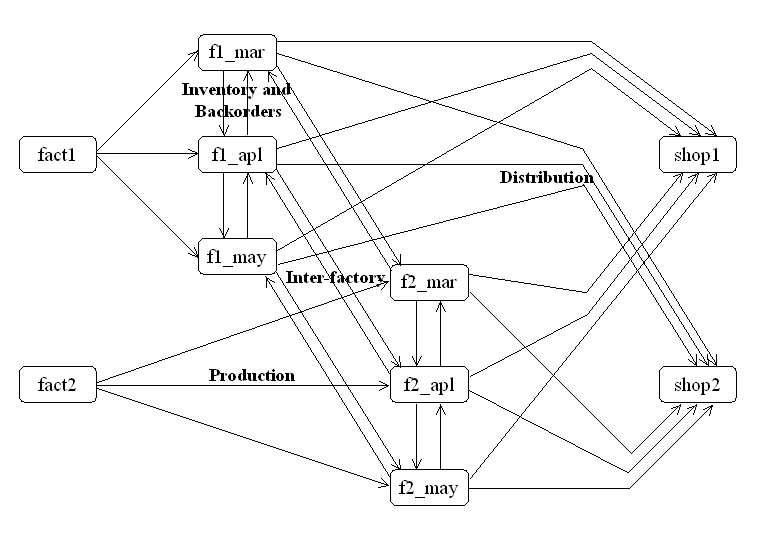| The INTPOINT Procedure |
Examples: INTPOINT Procedure
The following examples illustrate some of the capabilities of PROC INTPOINT. These examples, together with the other SAS/OR examples, can be found in the SAS sample library.
In order to illustrate variations in the use of the INTPOINT procedure, Example 2.1 through Example 2.5 use data from a company that produces two sizes of televisions. The company makes televisions with a diagonal screen measurement of either 19 inches or 25 inches. These televisions are made between March and May at both of the company's two factories. Each factory has a limit on the total number of televisions of each screen dimension that can be made during those months.
The televisions are distributed to one of two shops, stored at the factory where they were made, and sold later or shipped to the other factory. Some sets can be used to fill backorders from the previous months. Each shop demands a number of each type of TV for the months of March through May. The following network in Figure 2.12 illustrates the model. Arc costs can be interpreted as production costs, storage costs, backorder penalty costs, inter-factory transportation costs, and sales profits. The arcs can have capacities and lower flow bounds.

|
There are two similarly structured networks, one for the 19-inch
televisions and the other for the 25-inch screen TVs.
The minimum cost production, inventory, and distribution plan
for both TV types can be determined
in the same run of PROC INTPOINT.
To ensure that node names are unambiguous, the names of nodes
in the 19-inch network have suffix _1, and the node names
in the 25-inch network have suffix _2.
Example 2.1: Production, Inventory, Distribution Problem
Example 2.2: Altering Arc Data
Example 2.3: Adding Side Constraints
Example 2.4: Using Constraints and More Alteration to Arc Data
Example 2.5: Nonarc Variables in the Side Constraints
Example 2.6: Solving an LP Problem with Data in MPS Format
Example 2.7: Converting to an MPS-Format SAS Data Set
Copyright © 2008 by SAS Institute Inc., Cary, NC, USA. All rights reserved.